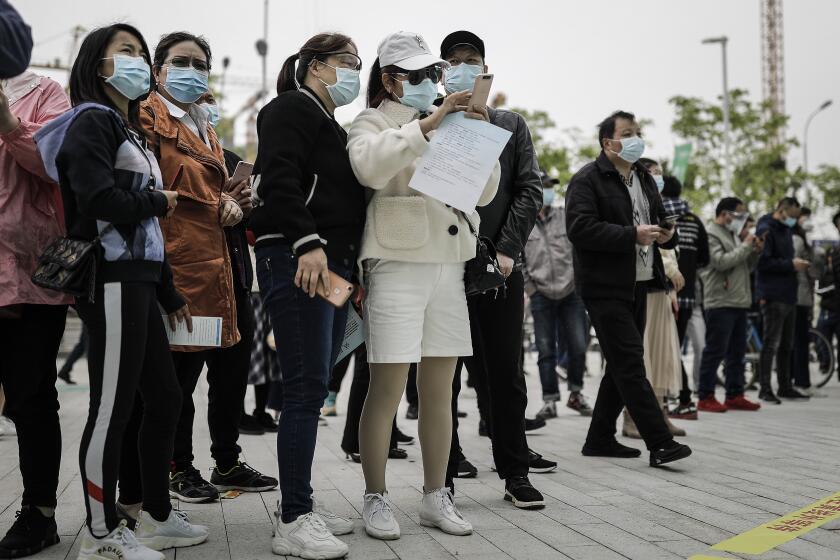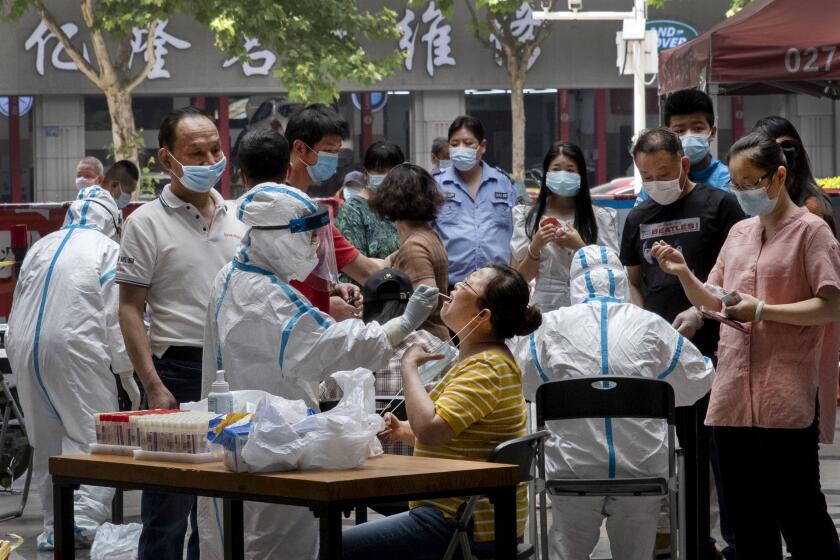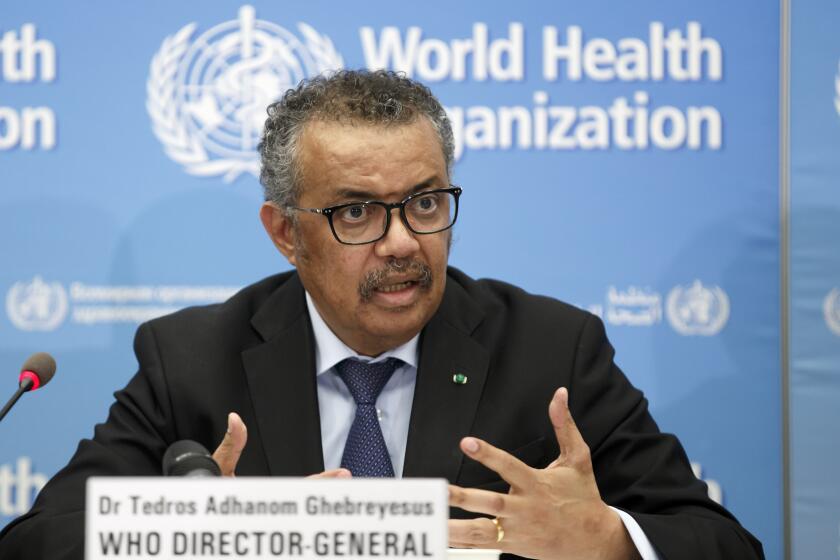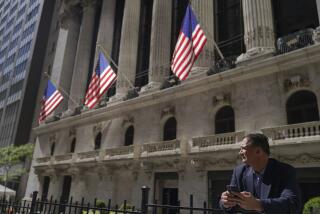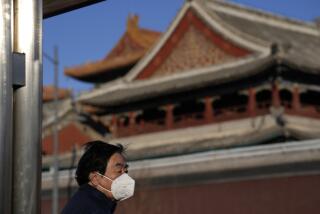China boosts spending but unveils no big steps for its coronavirus-hit economy
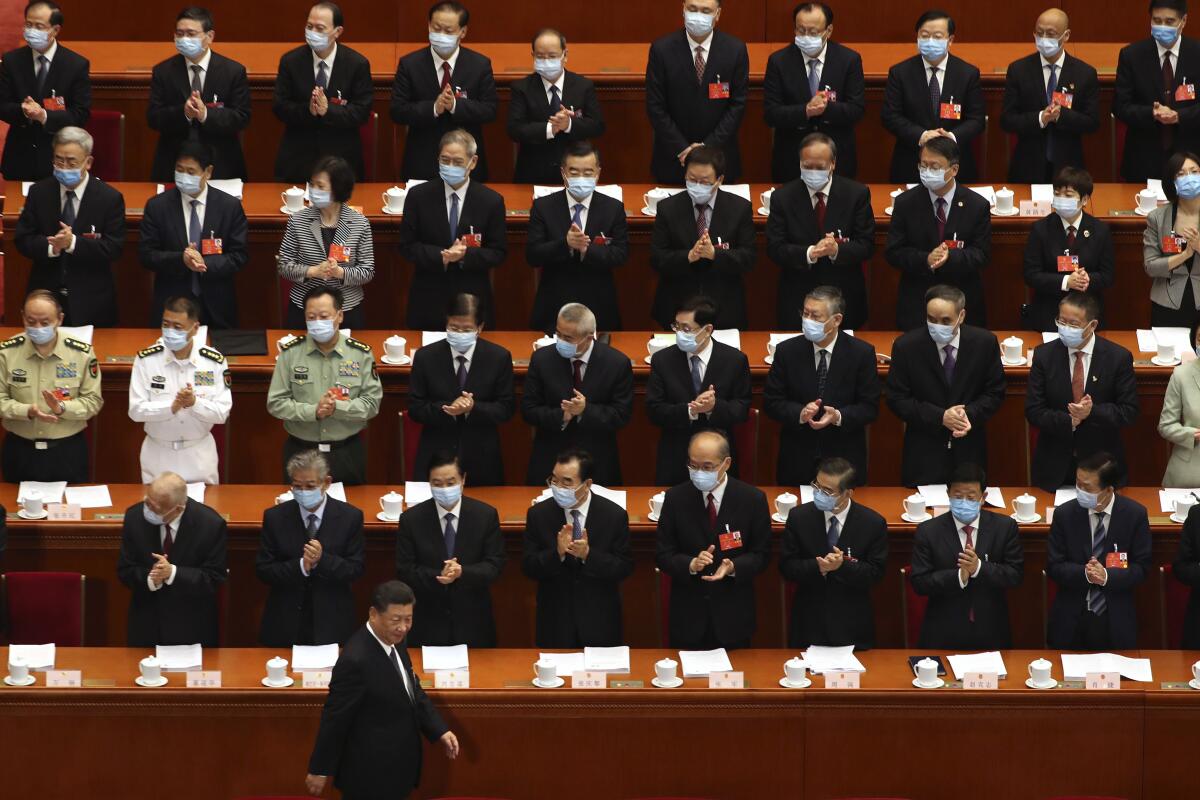
- Share via
BEIJING — China’s No. 2 leader Friday promised higher spending to revive its pandemic-stricken economy and curb surging job losses but steered clear of launching a massive stimulus on the scale of the United States or Japan.
Premier Li Keqiang, in a speech to legislators, said Beijing would set no economic growth target, usually a closely watched feature of government plans, in order to focus on fighting the outbreak. Li’s address to the National People’s Congress came on the heels of a newly introduced and controversial national security law that would tighten China’s grip on Hong Kong.
The battle against the coronavirus “has not yet come to an end,” Li warned. He urged the country to “redouble our efforts” to revive the struggling economy.
The pandemic that prompted the government to isolate cities with 60 million people added to the strains facing the ruling Communist Party, including anti-government protests in Hong Kong and a tariff war with Washington.
China, which has reported 83,000 virus cases and 4,632 deaths, was the first economy to shut down factories, shops and travel to fight the virus. It became the first to reopen in March, but is struggling to revive activity.
Private-sector analysts say as much as 30% of the urban workforce, or as many as 130 million people, lost jobs at least temporarily. They say as many as 25 million jobs might be lost for good this year.
The Chinese Communist Party’s biggest concern is unemployment. Jobs and livelihoods, hit by months of coronavirus lockdown, are the top priority.
The government’s budget deficit will swell by $140 billion this year to help meet targets, including creating 9 million new urban jobs, Li said. That is in line with expectations for higher spending but a fraction of the $1-trillion-plus stimulus packages launched or discussed by the United States, Japan and Europe.
“These are extraordinary measures for an unusual time,” the premier said in the nationally televised speech.
Beijing will give local governments $280 billion to spend on preventing job losses, making sure the public’s basic needs are met and helping private companies survive, Li said.
Li said Beijing set no growth target due to the “great uncertainty” of the epidemic and to enable officials to focus on other goals.
One month after the city of Wuhan, China, celebrated its reopening, new COVID-19 infections emerge.
The world’s second-largest economy contracted by 6.8% over a year earlier in the three months ending in March after factories, offices, travel and other businesses were shut down to fight the virus. Forecasters expect little to no growth this year, down from 2019’s 6.1%, already a multi-decade low.
The big deficit “indicates significant policy support for the domestic recovery,” Louis Kuijs of Oxford Economics said in a report.
However, Beijing is reluctant to launch a stimulus that would add to already high Chinese debt and strains on the financial system, Kuijs said.
Li also promised to work with Washington to carry out the truce signed in January in their fight over Beijing’s technology ambitions and trade surplus. The premier gave no details, but President Trump has threatened to back out of the deal if China fails to buy more American exports.
China and critics like the U.S. do battle over narrative of coronavirus crisis
Strains with Washington have been aggravated by Trump’s accusations that Beijing is to blame for the coronavirus’ global spread.
Also Friday, the government announced that China’s military budget, the world’s second-biggest after the United States, would rise 6.6% to $178 billion. The military budget excludes some large items, including acquisitions of major weapons systems.
This year’s annual session of the ceremonial National People’s Congress is being held under intensive anti-disease controls. Officials are holding news conferences by video instead of meeting reporters face to face. Reporters are required to undergo laboratory tests for the virus before being allowed into the press center.
The session caused a stir with a proposed Hong Kong security law that will authorize the NPC to change the territory’s Basic Law, or mini-constitution, to require its government to “prevent, stop and punish acts endangering national security,” according to Wang Chen, a deputy chairman of the Congress’s Standing Committee.
Thursday’s move appears to have been prompted by anti-government protests in Hong Kong that began in June over a proposed extradition law and have expanded to cover other grievances and demands for more democracy. A similar measure was withdrawn from Hong Kong’s legislature in 2003 following massive public protests.
Wang said Beijing had to take action because activities in Hong Kong “threatened national security,” according to the official Xinhua News Agency. Wang blamed the territory’s failure to enact such measures on “sabotage and obstruction” by “external hostile forces” and people “trying to sow trouble in Hong Kong.”
The Trump administration is delaying submission to Congress of a report on Hong Kong’s status to see whether the NPC takes steps that “further undermine” its autonomy, said a spokesman for the U.S. Embassy in Beijing.
“Any effort to impose national security legislation that does not reflect the will of the people of Hong Kong would be highly destabilizing, and would be met with strong condemnation from the United States and the international community,” said spokesman Frank Whitaker in an email.
Amnesty International complained in a statement that such “repressive security regulations” are a “threat to the rule of law in Hong Kong” and an “ominous moment for human rights in the city.”
Hong Kong’s main stock market index tumbled 5.6% on the news. Other Asian markets also declined due to concern about U.S.-Chinese tension but none by such a wide margin.
Li called on government officials to make progress in an array of areas including employment, trade, attracting foreign investment, meeting the public’s basic living needs and ensuring the stability of industrial supply chains.
Li warned that ensuring economic growth was “of crucial significance” even though Beijing set no official target. Pressure on employment has “risen significantly,” he said.
Automakers and other manufacturers say production has rebounded almost to normal levels, but consumer spending, the main engine of economic growth, is weak amid widespread worries about potential job losses.
Forecasters say China is likely to face a “W-shaped recovery” with a second downturn and millions of politically volatile job losses later in the year because of weak U.S. and European demand for Chinese exports.
The ruling party hopes to achieve longer-term goals including eliminating rural poverty despite virus-related disruptions of efforts to double economic output and incomes from 2010 levels by this year.
“We will give priority to stabilizing employment and ensuring people’s livelihood and resolutely win the battle to overcome poverty,” the premier said.
More to Read
Sign up for Essential California
The most important California stories and recommendations in your inbox every morning.
You may occasionally receive promotional content from the Los Angeles Times.
